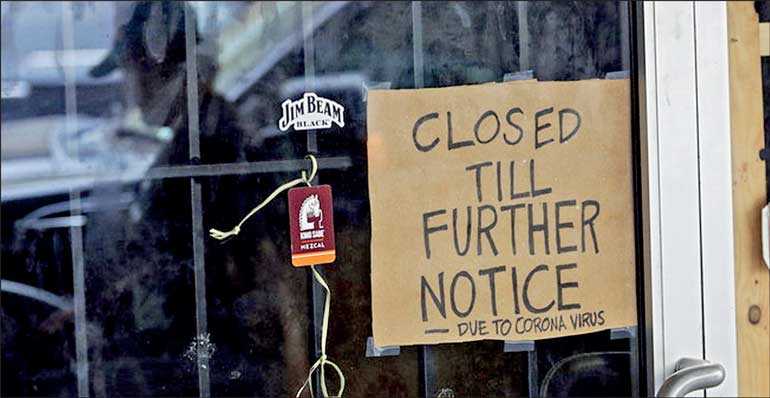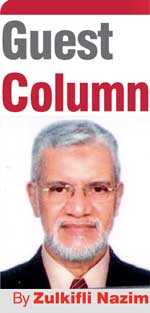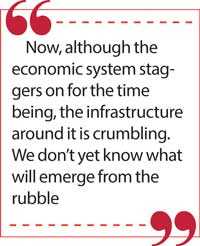Wednesday Feb 18, 2026
Wednesday Feb 18, 2026
Friday, 26 June 2020 00:00 - - {{hitsCtrl.values.hits}}

In a weird, disorientating age marked by political earthquakes and volcanoes – shock election results, constitutional chaos, new parties, new leaders, new governments, it is better to go below the pseudo  calm surface and look at what is animating all this turmoil – people never realised the movements of the tectonic plates underneath far below the surface. They were just taking everything and anything at face value.
calm surface and look at what is animating all this turmoil – people never realised the movements of the tectonic plates underneath far below the surface. They were just taking everything and anything at face value.
There is mass disillusionment, certainly, with the organs of the State that are supposed to mediate and regulate these forces – three quarters of the population believe, that politics ‘is not fit for any real purpose’.
In the gap between the mentality of a sclerotic governing class which has grown rigid and unresponsive with age, unable to adapt or compromise.
Right throughout, the political scenario has not been uniform. It has encompassed great changes to the ways in which we work, play and communicate, to the technologies we use and to the tales we tell about ourselves.
On and on, the ever-growing rivalry between people, communities, races, religions and caste, the economic system that was built around that principle imploded during the financial crash on the advent of the coronavirus, with spectacular global consequences.
In Sri Lanka, after the COVID-19 pandemic, logic contradicted the lived reality of millions. Our political leaders tried to carry on as if nothing had really changed; the grammar and syntax of institutional power remained the same, as did the lens through which the press evaluated and reported it. But although liberal capitalism has so far endured, superficially at least, something important did change, and that was the logic behind the economic system, the justification it offered up for its existence.
Now, although the economic system staggers on for the time being, the infrastructure around it is crumbling. We don’t yet know what will emerge from the rubble.
The doors and windows of the legislative house remain closed and no one gets in, not even through the dog flap. It is as if politics has shut itself up in its own castle and is peering out from behind the curtains at the uproar on the street, an unhelpful attitude which only increases the citizen’s feeling of distrust and causes further unrest.
At this rate rebellions will begin to take root. They will definitely come from the left and the right, from the young and the old, and they will soon manifest themselves at the ballot box, on the street, and in a vast array of different forms.
They will go off haphazardly, in multiple directions, and political pandemonium will certainly ensue; either politics throws open the doors or it won’t be long before they will be kicked in by angry citizens.
Now that organised civil society has less of a say, and they still fall far short of what is needed, it is imperative that citizens’ initiatives bring the needs of the people to the doorstep of the legislator. But what we see are new political instruments that are made to function as desperate ways of keeping the citizen out. What path those new forms may take, and the disturbances they inevitably produce, is  certainly going to have a revolutionary impact on us all. Without drastic adjustment, this system cannot last much longer. If you look at the history of voting, the decline in voter turnout and party membership, and at the way politicians are held in contempt, if you look at how difficult it is to form governments, how little they can do and how harshly they are punished for it, if you look at how quickly populism, technocracy and anti-parliamentarianism are rising, if you look at how more and more citizens are longing for participation and how quickly that desire can tip over into frustration, then you realise we are up to our necks in annoyance and defeat.
certainly going to have a revolutionary impact on us all. Without drastic adjustment, this system cannot last much longer. If you look at the history of voting, the decline in voter turnout and party membership, and at the way politicians are held in contempt, if you look at how difficult it is to form governments, how little they can do and how harshly they are punished for it, if you look at how quickly populism, technocracy and anti-parliamentarianism are rising, if you look at how more and more citizens are longing for participation and how quickly that desire can tip over into frustration, then you realise we are up to our necks in annoyance and defeat.
Our familiar idea of mass democracy is the one in which most people are content to stay home and let someone else speak on their behalf – an elected representative, a judge, a professional critic, expert or commentator. It involves professionally managed parties, agencies, newspapers and publishers, through whom matters of importance are safely routed, and where everyone plays by the same rules.
But in order for this to work, the vast majority of people must be content to stay quiet most of the time, and to trust those who speak in place of them. That, it seems, is something that people are increasingly reluctant to do.
As trust in professional politicians and the media declines around the world, support for direct democracy has been rising. Where politics becomes infused by the logic of crowds, it becomes less about peaceful political representation, and more about mobilisation.
Whether on the street or online, crowds are not a proxy for something else, as, for example, a Parliament is meant to be a proxy for its electorate or a judge is the face of the justice system. They don’t purport to represent society as a whole or what the whole nation thinks.
As the election draws near, the activity of intrigue and the agitation of the populace increase; the citizens are divided into hostile camps, each of which assumes the name of its favourite candidate; the whole nation glows with feverish excitement; the election is the daily theme of the public papers, every media – audio, visual and social, the subject of private conversation, the end of every thought and every action, the sole interest of the present. As soon as the choice is determined, this ardour is dispelled; and as a calmer season returns, the current of the ‘State’, which had nearly broken its banks, sinks to its usual level: but who can refrain from astonishment at the causes of the storm that brought about devastation.
Historical paradigms do not end neatly and tidy up behind them as they leave; nor do new ones arrive fully formed, ready to fill the void. What we can say is that we are living simultaneously through the slow-burn decline of a still-present past, and the birth pangs of contested futures. Many of those who traditionally navigate the political terrain on our behalf – pundits, columnists and politicians are scratching their heads, and staring at outdated maps in utter confusion.
Most journalists continue to fixate and patronise on the personalities, parties and parlour games of Parliament, as if the answer to where the turmoil comes from must lie somewhere within its limits. Gradually, many of the political, economic and social building blocks of the country around us are transformed. While most news coverage feels weightless and free-floating and most news coverage is a historical, landing with instant exciting displays, but little context.
We see the ways in which the tone of most news coverage reflects the outlook of our formal politics, and formal politics is failing in our midst. It is travelling into the crevices where an alternative politics is beginning to materialise. We, the ordinary clueless citizens are grounded, embedded and sunk in concrete, earth and water, suffocating, drowning and buried alive.